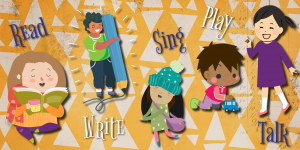
Disfluency: an involuntary disruption in the flow of speech that may occur during normal childhood development of spoken language or during normal adult speech but is often symptomatic of a speech impairment.
-- Definition from Merriam-Webster Dictionary
Disfluency is another way of saying that the flow of speech is different from what is expected. This can be drawn out syllables (“Wwwwwhere is the dog?”), repetition (“I want I want to go play”), or blocks in speech (child looks like they are trying to say something, but no sound is coming out).
About five percent of children will experience a disfluency in their speech, usually between 2 ½ and 5 years of age. This is a normal part of development with the amount of information their young brains are absorbing. Some children will continue to stutter after this period for one reason or another. This is not a big deal. Your child is unique, as is their experience of the world. If your child wishes to see a speech-language pathologist they can help your child by encouraging a healthy attitude about speaking and reduce the degree and frequency of the stutter.
“Your child is not broken. It’s just a communications disorder…nothing more, nothing less. If they want therapy, that’s great. If not, that’s great too. Let your child’s wishes take the lead here. And don’t be surprised if those wishes change as time goes on.”
-- JoAnne Pope, writer, educator, and stutterer
Besides seeing a speech-language pathologist, there are ways to help your child in everyday life.
- If a child mentions their stutter, it is okay to acknowledge its existence. Be open and honest about this experience.
- Don’t finish your child’s sentences. They can make themselves known. Just as an adult would be frustrated if you finished their thoughts, so will a child.
- Don’t tell your child to “slow down,” “start from the beginning,” “take a deep breath,” etc. Again, imagine how annoying this would be if another adult told this to you.
- Treat your child that stutters the same way you treat siblings or other children when it comes to rewards and consequences for behavior.
- Allow your child to choose when and where they talk. Don’t force them to give a speech in front of a crowd if it makes them uncomfortable.
- Be an advocate for your child. Work with your child’s daycare and/or school and let them know about your child’s situation.
- Your child is more than their spoken voice. Encourage and praise other activities that your child enjoys. Does your child like art? Celebrate their creations! Do they like sports? Play soccer together in your free time.
- Take some time each day to enjoy one-on-one time with your child, uninterrupted by screens. This can be as little as five minutes as long as it is well spent.
- Make sure your child knows they are loved unconditionally. Every child wants to know that they are loved and cared for.
Online resources for parents
- National Stuttering Association
- National Stuttering Association Youtube Channel: Watch recorded webinars created for and by the stuttering community
- National Stuttering Association Page for Parents
-Megan, Children's Team, Kirk-Bear Canyon Library
Sources
- “Disfluency.” Merriam-Webster.com Dictionary, Merriam-Webster, https://www.merriam-webster.com/dictionary/disfluency. Accessed 12 Mar. 2021.
- Pope, JoAnne. “Stuttering info.” Message to Megan Hellwig. 9 March 2021. Email.
- Stuttering in Toddlers & Preschoolers: What’s Typical, What’s Not?
- 7 Tips for Talking with the Child Who Stutters
- KidsHealth.org: Stuttering
 Read, Write, Talk, Sing, Play!
Read, Write, Talk, Sing, Play!
The day children are born, their brains are primed for language. Talking with your child about anything and everything helps them build oral language skills, which are critical to early literacy!
Read more about early literacy and how you can make a difference in your child's life.

